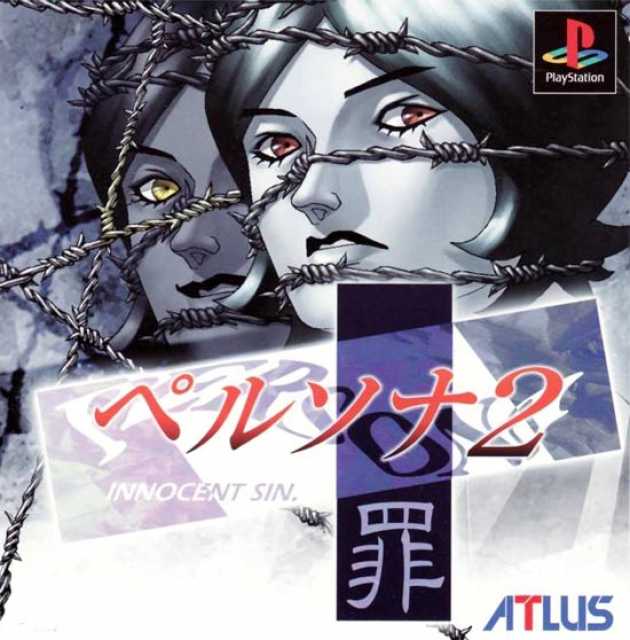A very gratifying game that takes its sweet time becoming that.
In 1997, Atlus released its first serious stateside Shin Megami Tensei game in the form of Revelations: Persona. (Technically, Jack Bros. preceded Persona by two years, yet it was a light-hearted dungeon crawler released for the doomed Virtual Boy, explaining its lesser significance to the series.) Unfortunately, this was not the best way to introduce non-Japanese audiences to the series. Ignoring the problems created in its spotty localization, Revelations was ultimately an obtuse, unexciting experience.
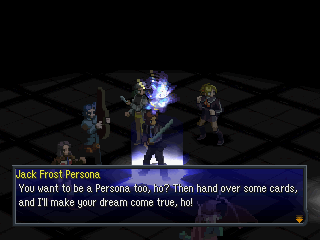
Though this is not to say that everything about the game was bad. At its heart, it had some good ideas, and the story demonstrated a clear and satisfying artistic direction. This likely explains why the game was successful enough to warrant a sequel in the form of Persona 2: Innocent Sin (although not successful enough to see an international release in its time). Innocent Sin vastly improves upon nearly every aspect of Revelations imaginable, from the story and presentation to the various systems it contains. True, Innocent Sin retains the steep learning curve of its predecessor, but penetrating this initial barrier will direct you to a highly rewarding video game.
A significant reason why the game is so rewarding is because of the story, and the story works mainly because of the characters that populate it. Just about every character in the game is memorable and brimming with personality, from the egotistical Michelle to the confrontational Lisa Silverman. A large part of this is because of smart portrait use, but most of it is simply because of very good writing. So good is the writing that even the silent protagonist is oddly expressive. At times, he can even be more emotive than the rest of the cast. Predictably, this leads to entertaining moments throughout the narrative, such as some of the terrorist attacks (surprisingly) and a late-game instance that forces characterization on the silent Tatsuya, but in addition to this, every character is developed extremely well. Each party member gets their own compelling character arc that contributes much to the plot and makes it easy to relate to them in their struggles.

Yet even without relying on its characters, Innocent Sin has a fantastic story, mainly because of its thematic mastery. The game presents many themes at once, from more overt ones like Tarot/Zodiac and Jungian psychology, to more slightly lower key themes like flowers and poor parenting. The most prevalent theme, though, and the best one of the game, is that of dreams and aspirations. Especially halfway through the story, the game explains in vivid detail just how one should pursue their dreams and aspirations. More specifically, it shows time and time again how bad an idea it is to hand your dreams over to another person. While this sounds simple, the reality is that Innocent Sin explores every facet of this idea possible, and it is clear that the writers made absolutely sure that every element clearly contribute some meaning to this theme. True, the story can be forceful about its lessons, but it handles them well enough for this to be perfectly acceptable.
However, the story is not without its flaws, presentation being one of them. This is not to say that the game looks or sounds bad (quite the opposite, actually), but rather that at least at first, the story is not friendly to the uninitiated. Innocent Sin does not spend much time establishing its concepts, instead pretending that some of its more supernatural elements as commonplace. Ideally, it should leave more time for meaningful story development, but at first, it is simply confusing and demanding of more explanation. In addition, it comes off as inconsistent, as certain elements (such as magical other selves) are completely normal while others (Nazi robots, or just about anything relating to Nazis) are subject to greater scrutiny from the main cast. Minor translation issues certainly do not make this issue less troublesome.
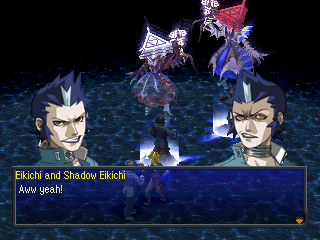
Similar to its examination of dreams, this high bar of entry is a constant factor throughout the Innocent Sin experience. Nowhere is this more prominent than the ever-important battle system. Although it is hard to call the system as a whole grindy, grinding battles is, at times, a necessary part of the game; worse yet, most of these instances are at the absolute beginning of the game. At this point, rewards from battles will invariably be very small, and choosing between battle and contacts is always at the expense of the other. Worse still, in addition to leveling your characters, you are also required to level your Personas, which not only level separately from the characters, but only gain experience when casting spells. Predictably, this necessitates many battles simply to keep pace with what the game wants out of you before you can advance to the better parts of the game.
All of this is coupled with the initially confusing contact system. In addition to fighting demons head-on, it is also necessary to communicate with them, affecting their mood in such a way that they give you important items. However, at first, it is not clear what options will do what. There is no way to know how a given option will affect a demon, and all the (seemingly) useless information the game gives you does not illuminate this matter. To make matters worse, many of your options will do absolutely nothing much of the time, limiting contacts immensely. For a good portion of the game, the system seems to be nothing more than clumsily guessing what will make a demon interested or happy and spamming that until you get what you want.
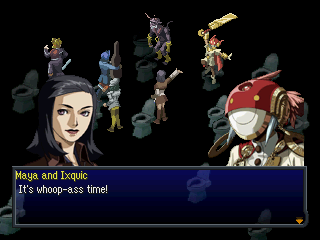
Yet experimenting around is exactly what makes the contact system work so well. Every battle provides an opportunity for many humorous interactions with the demons (having a manly chat, singing for them, etc.) with even more possibilities for how they will respond. This (along with other developments throughout the game) makes it important not to stick to a few options throughout the game, essentially forcing you to get as much out of the contact system as possible. In addition, over time, many of the system痴 problems slowly disappear. Fusion requirements become more reasonable, the system痴 (oddly inexplicable) logic eventually makes itself manifest, and the rewards become substantial enough that splitting between the two still leaves you with a decent reward.
Much of what has been said about contacts could apply equally well to the actual combat, too, although it does not initially seem this way. Unlike the former, battles are largely uninteractive; you set up a basic plan for how your characters will behave, and they go on auto-pilot until told otherwise. While this makes the inevitable grinding far easier to bare, it leaves quite a bit to be desired. This desire is fulfilled through Fusion spells. While not all of them are worthwhile (a complaint equally applicable to several other spells), many more are incredibly useful in battle, often to the point of becoming a main boss battle strategy. However, their true enjoyment derives from discovering them rather than using them. Even though the game gives no hints as to what will result in a Fusion spell (similarities to other Fusion spells notwithstanding), there are more than enough that stumbling upon them by accident is an inevitably, and it is hard to think of anything more enjoyable than seeing the hand of God pound your foes with absolutely no warning.
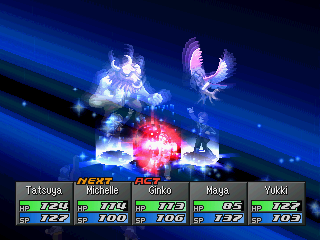
Outside battles, though, there is still much to be had with Innocent Sin. In fact, side content also happens to be one of the game痴 strong points. For much of the game, this comes in the form of spreading rumors and altering reality through them. While this does allow for customization of the world around you (to a certain extent), for the most part, it opens up new enemies and side-quests. Although they require digging through the various NPCs of Sumaru City, the rewards are often enough to justify this investment. Disappointingly, though, the rumor system largely disappears for much of the game, migrating to the beginning and end for its influence. Fortunately, though, this gap is filled with various divergent choices and secrets, adding a decent chunk of replay value to the package.
Not that the replay value is necessary for this game, as what else is there already works incredibly well. The story is entertaining and profound; the presentation is as polished as they come; and the various mechanics ensure that you will make the most out of them and enjoy the entire process. Although it takes a while for the game to hold true to these promises, the payoff is certainly worth it for those willing to see it through.
